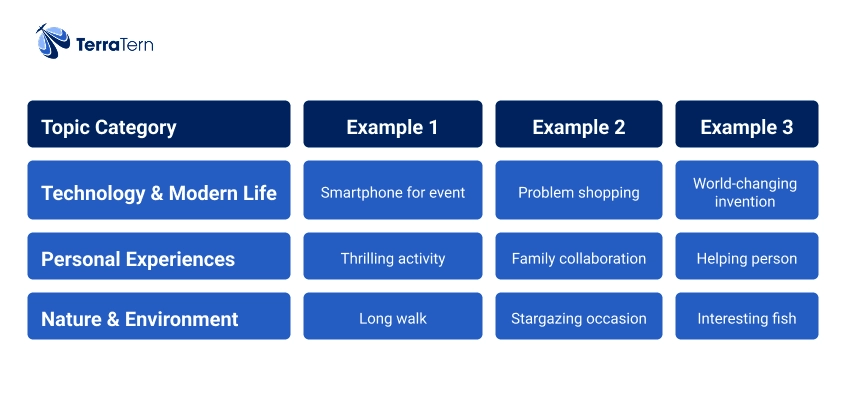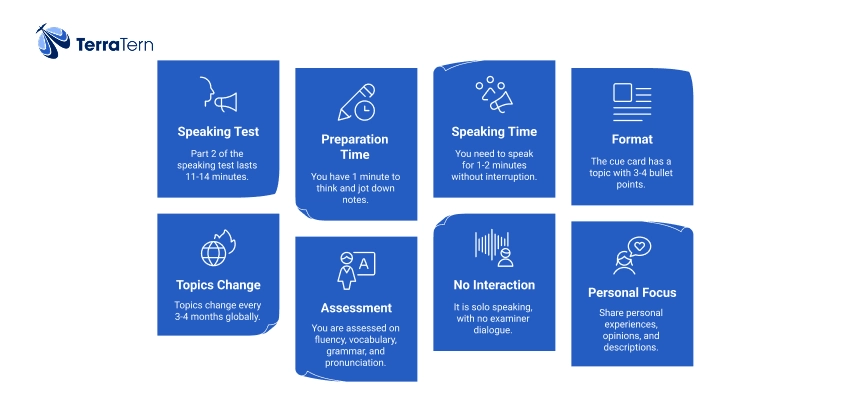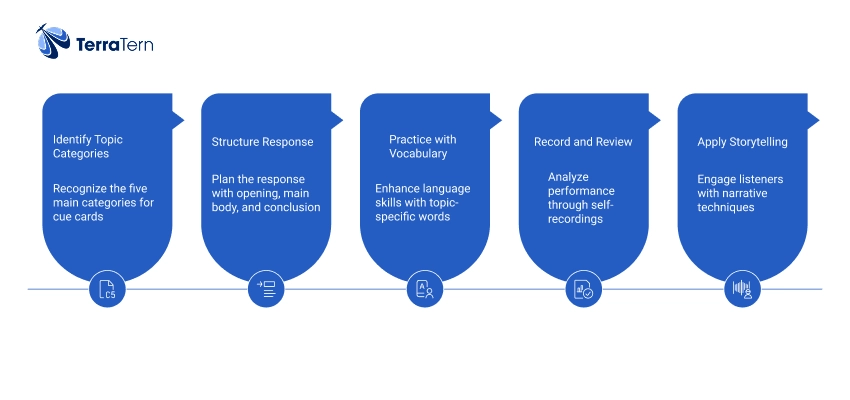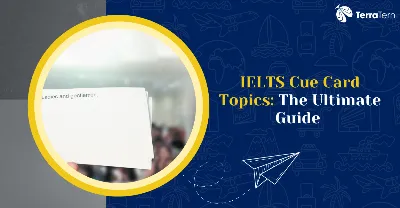Key Highlights
- What Are IELTS Cue Card Topics?
- Trending IELTS Cue Card Topics (May–August 2025)
- IELTS Cue Card Topics with Answers in 2025: Updated
- IELTS Cue Card Topics 2020 – Still Relevant?
- How to Answer IELTS Speaking Cue Card Topics?
- IELTS Speaking Cue Card Topics – Categories & Themes in 2025
- IELTS Cue Card Marking Criteria & Band Descriptors in 2025
- IELTS Speaking Cue Card Topics – Preparation Tips & Resources
- IELTS Cue Card Topics – 2020 vs. 2025: What's Changed?
- Latest Facts and News on IELTS Speaking Test Duration (2025)
- Conclusion
The IELTS Speaking test is changing as always, and those aiming at a certain band score should pay attention to the newest cue card issues. Topic creation has also been faster and more interesting, which makes the assessments more engaging, as IELTS interviewers look for more complex and challenging English skills throughout 2025. In this guide, we will cover everything there is to know from the most relevant trending IELTS cue card topics to the most effective responding methods to ensure the best expected results. Newbies and returning test customers hoping to improve their results alike can benefit from the provided resources to build the required preparation confidence for the speaking test.
To ensure an effective outcome for an IELTS exam, one must pay attention to the extensively described types and structures of cue card topics as an integral part of the speaking section of the exam. Structured as talk prompts, IELTS cue card topics are given in the second part of the speaking exam. Knowledge of the goals and expectations is key when studying for any test. Let’s know more about IELTS cue card topics with answers!
What Are IELTS Cue Card Topics?

During the IELTS exam’s Speaking Part 2, candidates are given a special type of prompt known as IELTS cue card topics. These prompts have a particular structure and purpose; it is important to know them for effective preparation.
Key Characteristics
Before devising the preparation strategies, it is important to clarify the features that mark the existence of IELTS cue card topics in the IELTS speaking test.
-
A card is given to the participants with a certain topic and 3-4 pointers that are to be addressed.
-
Participants get one minute to think and jot down notes.
-
Speaking turns are 1-2 minutes of uninterrupted speech.
-
Speakers draw from their personal anecdotes, thoughts, descriptions, and even imaginary situations.
-
No communication occurs with the examiner during the speaking segment.

Common Bullet Point Patterns
Grasping how bullet points are formulated helps candidates foretell the information they need to give and arrange their answers in a more streamlined manner.
-
Who/What/Where/When interrogatives for context framing
-
Your feelings or learning outcomes for self-assessment
-
Importance of memorability for advanced reflection
-
Any impact or influence on a wider viewpoint
With cue cards, examiners are able to evaluate how well candidates can sustain their speech on a specific topic, as well as measure their fluency, logical flow, range of vocabulary, grammar accuracy, and pronunciation skills.
Also Read: IELTS Speaking Topics: Trends, Tips & Sample Answers
Trending IELTS Cue Card Topics (May–August 2025)

The following themes seem to be highly reiterated in IELTS centres, and these are possibly the questions that learners may get:
-
Describe a problem you had while shopping either online or in a shop.
-
Describe an important event when you employed your cellphone/smartphone.
-
Describe a positive world-changing invention.
-
Personal Experiences & Relationships
These topics emphasise the intertwining of emotions, shared experiences, and relationships. They delve into one's emotional and social awareness:
-
Describe a thrilling activity you partook in with someone.
-
Describe a family member you would wish to collaborate with in future.
-
Describe a person who, during their free time, is actively involved in assisting other people.

-
Nature & Environment
The environment and nature are vital to these trending topics, which evaluate a person's awareness of the ecosystem as well as their concern for the environment:
-
Describe a long walk you have taken.
-
Describe an occasion when you were stargazing.
-
Talk about an interesting fish.
-
Daily Life Challenges
-
This includes encountering daily issues that require critical thinking and need determination to overcome:
-
Describe something that happened to you while stuck in traffic congestion.
IELTS Cue Card Topics with Answers in 2025: Updated

Practising with sample answers boosts skills and self-assurance. Here is a methodical breakdown for one of the current topics of discussion. Let’s know more about the IELTS cue card topics with answers:
-
Model Responses Outline
Below are model response outlines:
-
Introduction: Short overview of the situation
-
Main Body: Comprehensive overview of the processes and telephone involvement, as well as its relevance to the individual.
-
Feelings: Expressed emotions regarding the experience.
-
Conclusion: The summary includes personal assessments of implications.
-
Key Vocabulary Integration
Here are some words to integrate with key vocabulary:
-
Phones Related: software, network, efficiency, features
-
Feeling Words: thankful, nervous, Thankful, stress relief.
-
Wide List: Very important, instant entry, no difficulty.
-
Band 9 Response Elements
Below are band 9 responses:
-
Use of a wide range of vocabulary embracing unique grammatical forms and linkage words along the sequence.
-
Use natural phrase closings and distinguishable expressions.
-
Clear linkage words and key signals mark a smooth flow in the succession of perspectives.
-
Insights and remarks from the individual
IELTS Cue Card Topics 2020 – Still Relevant?
Most test takers are wondering how the old study materials can be applied in their present preparations, and therefore, it is worth knowing how past issues correlate with present issues. Knowing this relationship benefits the time allocating and resource mobilising process to achieve maximum preparation rate and skilled enhancement on all possibilities on the examination day.
The majority of candidates are anxious to understand whether rehearsing on historical subject matter with IELTS cue card topics is helpful. The answer would be categorically yes with serious caveats. Let’s learn more about the IELTS cue card topics 2020!
Reasons for Continued Relevance
Here is a breakdown of the reasons for the continued relevance of IELTS cue card topics:
|
Aspect |
2020 Topics |
2025 Topics |
Overlap |
|
Core Themes |
Personal experiences, places, and people |
Enhanced with digital elements |
70% |
|
Question Structure |
Standard bullet points |
More analytical prompts |
85% |
|
Vocabulary Requirements |
General English proficiency |
Specialised modern terms |
60% |
|
Skills Assessment |
Fluency, coherence, and grammar |
Same criteria with higher expectations |
90% |
Strategic Practice Approach
Here are some strategic practice approaches for IELTS cue card topics:
-
Use 2020 topics for fundamental skill development
-
Adapt older responses with contemporary examples
-
Practice diverse themes to build a comprehensive vocabulary
-
Focus on transferable storytelling techniques
How to Answer IELTS Speaking Cue Card Topics?

Time to get away from the familiarity in terms of the topic, into actual use, then we can see the logical step-by-step guide of creating a good impression with IELTS cue card topics that will show your level of English proficiency.
Coming up with a systematic response to the use of the IELTS cue card topics is instrumental towards enhancing the level of performance and strike. Let’s know more about IELTS speaking cue card topics:
-
One Minute Preparation Strategy
The way to maximise your time to prepare is by structuring your thoughts, thus developing a good outline of how a well-structured response can respond to all needs and yet retaining a natural flow in your speaking performance.
Stage-1 (Preparation Phase) (1 min):
-
Notice the readings of the topic and bullet points
-
Find examples and the most important elements of the stories
-
Make a simple plan using transition phrases
-
Write down applicable words and phrases
-
Framework of Response Structure
Knowing how to structure your speaking time also means that you have addressed every aspect of a topic without losing the interest of an examiner, and you are also able to show that you have mastered the art of organising language and structure.
Response Structure Framework:
-
Opening (15-20 seconds): put the topic into perspective
-
Main Content (60-80 seconds): Work all the points in the bullet list methodically
-
Conclusion (15- 20 seconds): Show a summary of significance and personal effect
-
Essential Delivery Strategies
Using tried and tested speaking strategies allows you to answer confidently and show your language ability across all 4 criteria. Use the past tense for experiences and the present tense for descriptions. Use specific details and examples to make it authentic. Use linking words to make it flow. Don’t rush. Be yourself.
Typical Mistakes to Avoid
-
Candidates can avoid performance-limiting behaviours that can lower their band scores across various criteria by being aware of their common mistakes.
-
Common mistakes to avoid: Memorising generic answers; Ignoring or only briefly mentioning bullet points; Speaking too fast out of nervousness;
-
Using too complex vocabulary incorrectly, and not using the full time given.
Also Read: Recent IELTS Speaking Topics: New Quiz, Trends & More
IELTS Speaking Cue Card Topics – Categories & Themes in 2025
To develop comprehensive preparation strategies, it's beneficial to understand how cue card topics are organised into distinct categories, each requiring specific approaches and vocabulary sets. This categorisation helps candidates build targeted skills and develop relevant language resources for maximum examination success across all potential topic areas.
Understanding topic categories helps candidates prepare more effectively by developing relevant vocabulary and example scenarios for each theme. Let’s learn more about IELTS speaking cue card topics:
-
Person-Based Topics
When dealing with questions about individuals, candidates need to master descriptive language and relationship terminology to create engaging character portraits that demonstrate sophisticated vocabulary usage and emotional intelligence.
These topics require candidates to describe individuals and their characteristics, relationships, or influences.
Common Question Types
Here are common question types that are asked:
-
Family members and their qualities
-
Friends and memorable experiences together
-
Public figures or celebrities you admire
-
People who influenced your life significantly
Key Vocabulary Areas
Here are the key vocabulary areas you need to focus on:
-
Personality Traits: ambitious, compassionate, charismatic
-
Relationship Descriptors: supportive, inspiring, reliable
-
Professional Qualities: dedicated, innovative, experienced
-
Place-Based Topics
Location descriptions test candidates' ability to paint vivid pictures and express preferences about environments.
Typical Categories
Here are the typical categories given:
-
Hometown or places you've lived
-
Tourist destinations and travel experiences
-
Educational institutions or workplaces
-
Natural environments and outdoor spaces
Essential Language Elements
Here are the essential language elements:
-
Geographical Features: mountainous, coastal, urban
-
Architectural Descriptions: modern, historical, spacious
-
Atmospheric Qualities: peaceful, bustling, vibrant
-
Object-Based Topics
These prompts focus on describing items, their significance, and personal connections to material possessions.
Common Objects
Here are common objects often mentioned:
-
Gifts received or given
-
Technological devices and their uses
-
Books, movies, or entertainment media
-
Personal belongings with sentimental value
Descriptive Frameworks
Here is a descriptive breakdown:
-
Physical characteristics: size, colour, texture, design
-
Functional aspects: purpose, efficiency, versatility
-
Emotional connections: memories, significance, impact
-
Event/Experience-Based Topics
Experience topics allow candidates to showcase narrative skills and personal reflection abilities.
Popular Event Categories
Here are the popular events that are mostly mentioned:
-
Celebrations and special occasions
-
Learning experiences and achievements
-
Challenges overcome or problems solved
-
Memorable journeys and adventures
Narrative Techniques
Here are the common narrative techniques used:
-
Chronological organisation with clear sequence
-
Sensory details for vivid descriptions
-
Emotional progression throughout the story
-
Lessons learned and personal growth
-
Abstract & Opinion-Based Topics
These sophisticated prompts require analytical thinking and the ability to express complex ideas clearly.
Abstract Concepts
Here are some abstract concepts mentioned:
-
Qualities you admire in others
-
Changes you'd like to see in society
-
Traditions and their importance
-
Future predictions and possibilities
Discussion Strategies
Here are some discussion strategies you can use:
-
Present multiple perspectives on issues
-
Support opinions with logical reasoning
-
Use hypothetical examples for illustration
-
Connect personal experiences to broader themes
IELTS Cue Card Marking Criteria & Band Descriptors in 2025
Understanding assessment criteria helps candidates focus their preparation on areas that directly impact their band scores.
|
Criteria |
Band 5 |
Band 6 |
Band 7 |
Band 8 |
Band 9 |
|
Fluency & Coherence |
Simple linking, repetition, hesitation |
Generally coherent, some hesitation |
Clear organization, smooth flow |
Wide range of cohesive devices |
Effortless, natural speech |
|
Lexical Resource |
Basic vocabulary, some errors |
Adequate range, some inaccuracy |
Flexible usage, good collocation |
Wide range, natural usage |
Precise, sophisticated vocabulary |
|
Grammatical Range |
Simple structures, frequent errors |
Mix of simple/complex, some errors |
Good range, mostly accurate |
Wide range, flexible usage |
Full range, natural accuracy |
|
Pronunciation |
Generally clear, some effort required |
Clear with minor issues |
Easy to understand, natural |
Natural, easy to understand |
Precise, natural delivery |
Band 7+ Achievement Strategies
Here are some achievement strategies that will help you get a +7 Band:
-
Develop topic-specific vocabulary banks
-
Practice complex sentence structures naturally
-
Record yourself to identify pronunciation patterns
-
Focus on natural stress and intonation patterns
IELTS Speaking Cue Card Topics – Preparation Tips & Resources

Effective preparation combines systematic practice with strategic resource utilisation and consistent skill development for IELTS cue card topics:
-
Study Schedule Framework
Here is a study schedule framework you can follow:
-
Week 1-2: Master basic response structure and timing
-
Week 3-4: Build topic-specific vocabulary and examples
-
Week 5-6: Practice diverse themes with mock scenarios
-
Week 7-8: Refine delivery and address specific weaknesses
-
Essential Practice Materials
Here is essential practice material you can use:
-
Official IELTS practice tests and sample responses
-
Topic-specific vocabulary lists and collocations
-
Recording devices for self-assessment and improvement
-
Timer for realistic practice conditions
-
Daily Practice Routine
Here is a daily practice routine you can follow:
-
15 minutes: Vocabulary building and review
-
20 minutes: Structured IELTS cue card topics practice
-
10 minutes: Recording analysis and improvement notes
-
5 minutes: Pronunciation and fluency exercises

-
Free Resources
Here are some free resources you can use:
-
IELTS official website sample materials
-
YouTube channels with examiner feedback
-
Online forums with recent topic discussions
-
Mobile apps for vocabulary and practice
-
Paid Resources
Here are some paid resources you can use:
-
Professional IELTS preparation courses
-
One-on-one tutoring with certified instructors
-
Comprehensive study guides with sample answers
-
Mock test packages with detailed feedback
IELTS Cue Card Topics – 2020 vs. 2025: What's Changed?
The evolution of IELTS cue card topics reflects changing global priorities and technological advancement, requiring candidates to adapt their preparation strategies accordingly.
Major Shifts Observed
Here are some major shifts observed in IELTS cue card topics:
|
Aspect |
2020 Focus |
2025 Evolution |
Impact on Candidates |
|
Technology Integration |
Basic digital usage |
Advanced online problem-solving |
Requires modern vocabulary |
|
Environmental Awareness |
General nature topics |
Sustainability and conservation |
Demands current knowledge |
|
Social Dynamics |
Traditional relationships |
Digital communication impacts |
Needs contemporary examples |
|
Global Perspective |
Local experiences |
International connections |
Requires broader awareness |
Preparation Adaptations
Here is how you can prepare for adaptation:
-
Update vocabulary with current technological terms
-
Incorporate contemporary examples and experiences
-
Develop awareness of global issues and trends
-
Practice discussing abstract concepts with concrete examples
Consistent Elements
Here are some consistent elements you can use:
-
Core assessment criteria remain unchanged
-
Personal experience emphasis continues
-
Storytelling skills remain highly valued
-
Time management requirements stay constant
Latest Facts and News on IELTS Speaking Test Duration (2025)
-
New topics in the IELTS cue card are changed after 3-4 months, selecting new topics in the test centres around the world to be in line with new trends and themes.
-
There are some frequent topics which appear regularly, such as personal life, technologies, travel, and accomplishments- challenging and relatable at the same time.
-
Most of the cue card topics are well covered with Band 9 sample answers, and this helps the candidates familiarise themselves with what the examiners need.
-
Examiners observe the tendency to move towards abstraction and analysis in 2025 and stipulate the need to think and reflect more critically.
-
Such traditional topics as memorable journeys or inspirational people are still widely represented, which proves that classic topics cannot be forgotten.
-
The number of searches for the term IELTS cue card topics with answers has also increased twofold in the last year as people desire a set of answers to IELTS.
Conclusion
Mastering IELTS cue card topics requires understanding current trends, practising systematically, and developing comprehensive language skills that demonstrate natural English proficiency. The 2025 updates reflect our increasingly connected world, emphasising digital literacy alongside traditional communication skills.
Success in Speaking Part 2 depends on consistent practice with diverse topics, strategic vocabulary development, and confident delivery of personal experiences and opinions. By following the structured approaches outlined in this guide, candidates can build the skills necessary to achieve their target band scores.
Remember that effective preparation combines understanding current topic trends with developing transferable skills that work across all possible IELTS cue card topics scenarios. Focus on authentic personal examples, clear organisation, and natural language usage to demonstrate your English proficiency effectively. Visit TerraTern to know more about IELTS-related queries!






